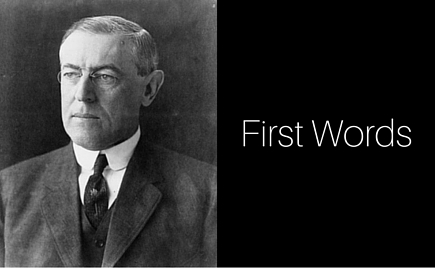First Words: Woodrow Wilson, March 4, 1913

In this ongoing series, the Miller Center’s First Year Project looks at key phrases from past inaugural addresses—the first words spoken by our new presidents. Today we look at Woodrow Wilson.
During his run for the presidency in 1912, Woodrow Wilson called for several consequential changes: limits on campaign contributions by corporations, tariff reductions, banking and currency reform, a federal income tax, direct election of senators, a single term presidency, the independence of the Philippines, and a breakup—rather than government regulation—of monopolies. With the Republican party split between incumbent President William Howard Taft and former President Theodore Roosevelt, who was running as a Progressive, Wilson won the presidency with 41.9% of the vote. Democrats also took control of the Senate and retained control of the House, a fact Wilson noted at the beginning of his speech.
These words, and Wilson's subsequent actions, helped lay the foundation for the modern activist presidency.
The success of a party means little except when the Nation is using that party for a large and definite purpose. No one can mistake the purpose for which the Nation now seeks to use the Democratic Party. It seeks to use it to interpret a change in its own plans and point of view.
…
We have been proud of our industrial achievements, but we have not hitherto stopped thoughtfully enough to count the human cost, the cost of lives snuffed out, of energies overtaxed and broken, the fearful physical and spiritual cost to the men and women and children upon whom the dead weight and burden of it all has fallen pitilessly the years through.
…
With the great Government went many deep secret things which we too long delayed to look into and scrutinize with candid, fearless eyes. The great Government we loved has too often been made use of for private and selfish purposes, and those who used it had forgotten the people.
…
There has been something crude and heartless and unfeeling in our haste to succeed and be great. Our thought has been "Let every man look out for himself, let every generation look out for itself," while we reared giant machinery which made it impossible that any but those who stood at the levers of control should have a chance to look out for themselves.
…
Nor have we studied and perfected the means by which government maybe put at the service of humanity, in safeguarding the health of the Nation, the health of its men and its women and its children, as well as their rights in the struggle for existence. This is no sentimental duty. The firm basis of government is justice, not pity. These are matters of justice.
Find out more about Woodrow Wilson.
Read Wilson’s entire inaugural address.
See a transcription of Wilson’s speech from his own typewriter. (Department of Rare Books and Special Collections, Princeton University Library.)